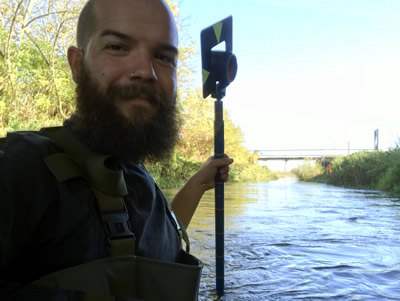Interview with Marcell Szántó (surveyor and land surveyor)
“…all students were given adequate attention and time by the teachers.”
Interview with Marcell Szántó, a surveyor and land surveyor, who is working, studying for a master’s degree and considering teaching (NNG Llc)
(Part 10 of the alumni interview series)

- What was your motivation for choosing our university or its predecessor institutions?
I definitely wanted to continue my studies in higher education. I loved maths, computer science and geography, so that helped me a little (or at least gave me a direction) when choosing a course.
- Exactly which predecessor institution did you study at? Which degree(s) did you obtain?
I started my studies at the University of West Hungary, but I had already graduated as a surveyor and land surveyor from Alba Regia Technical Faculty of Óbuda University.
- Can you recall your first memory of university?
I started university a week late because I had just returned from a year-long volunteering project in France. The delay meant that I missed all the socialising, so I came to class as a complete stranger. Luckily, I managed to blend in on the first day and didn’t suffer from any disadvantages.
- Did you find time to have fun while you were studying? What were your student years like at university?
I grew up near Székesfehérvár so I went to school there, I was not a student, but fortunately I didn’t miss out on the joint programmes. There was always time for fun. If I had just studied all the time, I might have been halfway through my university years.
- Can you describe what you loved most about the university?
The relatively small number of teachers and students of the faculty. The atmosphere was very friendly and family-like. Even though everyone has to look after their own progress as an adult student at the university, the small number of students meant that each student received adequate attention and time from the lecturers.
- What opportunities do you see in higher education today?
Although I have not studied the history of higher education in detail, the range of courses students can choose from has perhaps never been as diverse as it is now. With a little will and perseverance, anyone can become anything. I’m not saying that everyone should necessarily go to university, but those who do will certainly find their place. If not the first time, then the second or third time.
- Any advice for today’s youth on how to choose a university/career for themselves?
There’s no need to rush into anything, and it’s no problem if you don’t get it right for the first time. Surprisingly few people I know have a clear idea of what kind of training they want to do at the first attempt.
- Would you like to come back to study at Alba Regia Technical Faculty of Óbuda University to further your education?
Yes, I am currently thinking about a doctorate, and there is a good chance that I will continue my life in the Székesfehérvár area in 1 or 2 years, so I am quite likely to come back to study, and possibly teach.
- To what extent can you use what you have learned at our institution in your workplace?
I can use quite a lot of the things I have learned. I am currently using several of the software tools taught at the university. This was a plus point in the job interview for my current job, as I didn’t have to take the time to learn how to use the software. Also, of course, the theoretical knowledge I gained as a surveyor is very useful, which I can also put to good use in my current job.
- Did you want to do this as a child or did you have other “career dreams”?
I had absolutely no career dreams. Somewhere along the line, because of a more realistic orientation, I had a feeling that I would go into engineering or technology. It was quite by chance that I chose this course, but I have never regretted it ever since.
- With a degree in hand, what were the first few steps you took to further your career?
I enrolled in the Master’s programme in geophysics because it allowed me to complete a Master’s degree in a field slightly different from my undergraduate degree, with relatively few different subjects, and because it gave me the chance to pursue a PhD.
